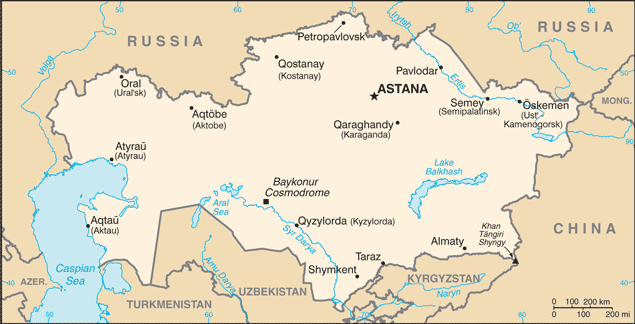Kazakhstan Country Profile

Drug policy
- The Government Programme to Combat Drug Abuse and Drug Trafficking was completed in 2011 and has the primary aim to reduce the negative consequences of the distribution of psychoactive substances.
- The programme includes development and improvement of the system of monitoring, coordination and international cooperation, prevention of drug use, treatment and rehabilitation of drug addicts and combating drug dealing and drug trafficking.
- The main directions of the national drug strategy are: reduction in the demand for drugs, drug supply reduction, reduction of consumption and harm reduction.
- Alternative forms of punishment for drug addicts that have committed criminal offensives are being introduced.
- The Counternarcotic Department cooperates with many non-governmental organisations on issues relating to demand reduction, rehabilitation, and youth prevention programs.
Treatment and Recovery Services
- The main providers of addiction treatment in the country are drug treatment clinics.
- The availability of treatment in remote or rural areas is limited due to the lack of health primary care and professionals working in the field. Access to inpatient treatment is also restricted for individuals living in these regions.
- There are several therapeutic communities that are run by the Centre for the Socio-Psychological Rehabilitation of Drug Addicts of the Committee on Narcotics and Drug Control of the Ministry of the Interior of Kazakhstan.
- The three-stage programme is available to patients only in 11 regions.
- Opioid substitution treatment was first provided in October 2008.
- The number of medical and social rehabilitation units has increased from 5 to 11 in order to develop medical and social rehabilitation of drug-dependent persons, and the number of residents has increased fivefold from 30 to 152 at the end of 2022.
- it is expected to increase the proportion of persons taken out of dynamic observation with long-term remission, to expand the availability of medical and social assistance for drug addicts by increasing the number of medical and social rehabilitation units from 11 to 20 and to increase coverage of opioid-dependent patients with opioid agonist maintenance therapy from 370 to 500 persons.
Prevention Services
- Regional programmes are the basic instruments in the field of drug prevention.
- The Republican Centre for Healthy Lifestyles in the main organisation involved in prevention activities. Centres provide information and psychosocial services.
- Efforts are particularly focussed on prevention of drug abuse among young people and events and campaigns are regularly held in schools.
- The ‘Self-knowledge and the moral and spiritual development of the individual’ programme is delivered in pre-school and higher education.
- ‘Trust points’ provide safe injecting equipment and promote safe sexual behaviour among injecting drug users. They also provide psychosocial counselling and deliver educational activities for drug users.
- Naloxone, which is the medicine often used in the prevention of overdoses among drug users, is available in healthcare facilities.
Recent Knowledge Share content about Kazakhstan

